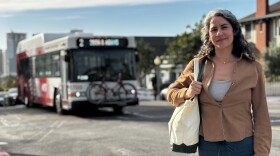People in El Paso's “Segundo Barrio” love a good party. Recently, a celebration was held for the opening of a new museum. This southernmost neighborhood sandwiched between downtown and the Mexican border is a place where immigrants first settled.
The flavor of Mexico is very much alive here. Aztec murals are splashed against apartment buildings that date back to the late nineteenth century. A woman in soft, transparent plastic sandals leans over the second floor railing of one of those apartments gazing at the fiesta below.
Her name is Berta Engels. She works at a local factory making uniforms for U.S. soldiers. When asked to evaluate President Obama's term thus far, she twists her lip sideways.
“To be honest, too many families are being separated. To deport the undocumented leaves children without their parents,” she said in Spanish. “I think it’s about time for immigration reform. It should not be a broken promise.”
Texas State Senator Jose Rodriguez, a Democrat, was also at the party. He said the Obama administration has continued President Bush’s policies stressing strong border security over immigration reform. He said it’s time to move on.
“People are, frankly, fed up with the rhetoric about the need to secure the border, to do more enforcement,” Rodriguez said. “Instead, we should be giving priority to legalization, to offering a work program, for Mexican workers.”
From Texas to California, Border Patrol agents have reported a decrease in the apprehension of illegal immigrants. But in El Paso, there’s been a surge in a different kind of immigrant: Refugees seeking asylum.
People are fleeing horrific drug related violence across the border in Ciudad Juarez and seeking refuge in El Paso.
Some cross out of desperation on a visitor visa and stay. They enroll their children in school and look for work while cramming into shelters, tiny apartments, or with relatives.
“It's a very underground life,” said Ruben Garcia, an immigration advocate. “You just aren't going to see it because people are just so afraid.”
Garcia is the director of Annunciation House, a place that provides shelter to immigrants in El Paso. Estimates of the numbers of Mexican refugees crossing into the El Paso area range from 30,000 to 100,000. But Garcia said it's a phenomenon happening all across the U.S.-Mexico border from Brownsville to San Diego.
If he could speak directly to the president, he would ask him to have empathy toward the victims of Mexico’s violent war against drug cartels.
“If you were my fairy godmother what I would ask of you is: Help President Obama understand the absolute imperative of providing protection for Mexican families that have been directly affected by the violence,” Garcia said.
While the issues in El Paso are somewhat unique because of its place on the border, people here share concerns with the rest of the nation: security, education, taxes and jobs.
This will be Obama’s second visit to El Paso in less than a year. He is scheduled to deliver remarks at the Chamizal National Memorial Park along the U.S.-Mexico border at 1:30 p.m. Mountain time, 12:30 p.m. Pacific time.
It is the first time a president visits the park in 50 years.







